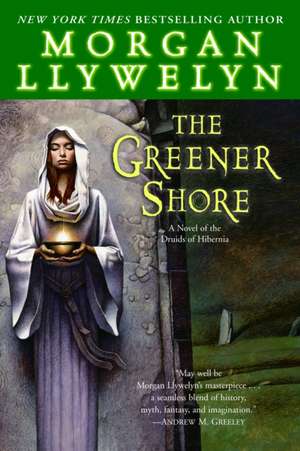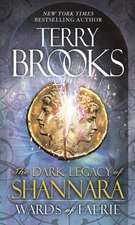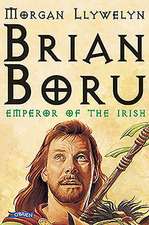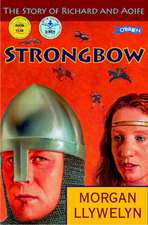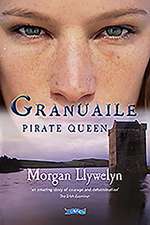The Greener Shore: A Novel of the Druids of Hibernia
Autor Morgan Llywelynen Limba Engleză Paperback – 31 mai 2007
As druids in Celtic Gaul, they had been the harmonious soul of their tribe, the Carnutes. But when Julius Caesar and his army invaded and conquered their homeland, the great druid Ainvar and his clan fled for their lives, taking with them the ancient knowledge. Guided by a strange destiny, they found themselves drawn to a green island at the very rim of the world: Hibernia, home of the Gael.
Here they would depend for survival on an embittered man who had lost his faith–and a remarkable woman who would find hers. Burning with hatred of the Romans, Ainvar can no longer command his magic. But his mantle falls on unexpected shoulders. In a beautiful, war-torn land of numerous kingdoms and belligerent tribes, Ainvar and his beloved wife, Briga, struggle toward an uncertain future. Their companions include the volatile Onuava, widow of their fallen chieftain; Lakutu, Ainvar’s dark and mysterious second wife; Ainvar’s son, Dara, who seems more drawn to poetry than to combat; and the “Red Wolf,” the young warrior who is as close as kin and is determined to find Ainvar’s missing daughter.
Other forces are at work in Hibernia as well–the spirits that haunt the island, forces older than even the magic of the druids. Through them Ainvar seeks his redemption . . . as Briga seeks her rendezvous with history.
Filled with the deep feeling, stunning detail, and rich characters that made Druids a masterwork, The Greener Shore is a superb saga of an amazing world and its wondrous ways–a much-awaited novel that will delight all the devotees of this admired author.
From the Hardcover edition.
Preț: 113.05 lei
Nou
Puncte Express: 170
Preț estimativ în valută:
21.63€ • 22.59$ • 17.86£
21.63€ • 22.59$ • 17.86£
Carte disponibilă
Livrare economică 25 martie-08 aprilie
Preluare comenzi: 021 569.72.76
Specificații
ISBN-13: 9780345477675
ISBN-10: 0345477677
Pagini: 301
Dimensiuni: 139 x 211 x 18 mm
Greutate: 0.37 kg
Editura: Del Rey Books
ISBN-10: 0345477677
Pagini: 301
Dimensiuni: 139 x 211 x 18 mm
Greutate: 0.37 kg
Editura: Del Rey Books
Recenzii
Advance praise for The Greener Shore
“The Greener Shore may well be Morgan Llywelyn’s masterpiece. A shimmering tale of ancient Ireland and the coming to its shores of a small band of Gallic Celts fleeing Caesar’s destruction of Gaul, it is a seamless blend of history, myth, fantasy, and imagination. One almost believes that Ms. Llywelyn was there at the time, a druid woman who was part of that peaceful immigration. Welsh in origin, American by birth and early life, and Irish by adoption, she is surely one of the great Celtic storytellers of her time.”
–Andrew M. Greeley
“A tale full of adventure and excitement; of magic, romance, and spiritual longing–a quest for identity. It is a brilliant sequel to the acclaimed novel Druids. Brilliant? There is no other adjective for the much admired work of Morgan Llywelyn.”
–Peter Tremayne, author of the Sister Fidelma series
Acclaim for Druids
“A masterpiece . . . From page one, the fires of your imagination will burn with a white heat. . . . Beware the druids! Unless you have twenty-four hours of nonstop reading time, don’t touch it!”
–Tulsa World
“Splendid and compelling.”
–Anne McCaffrey
“Llywelyn imaginatively and vividly portrays the druid rituals and their close ties to nature, and authentically depicts daily life among the Celts as well.”
–Publishers Weekly
From the Hardcover edition.
“The Greener Shore may well be Morgan Llywelyn’s masterpiece. A shimmering tale of ancient Ireland and the coming to its shores of a small band of Gallic Celts fleeing Caesar’s destruction of Gaul, it is a seamless blend of history, myth, fantasy, and imagination. One almost believes that Ms. Llywelyn was there at the time, a druid woman who was part of that peaceful immigration. Welsh in origin, American by birth and early life, and Irish by adoption, she is surely one of the great Celtic storytellers of her time.”
–Andrew M. Greeley
“A tale full of adventure and excitement; of magic, romance, and spiritual longing–a quest for identity. It is a brilliant sequel to the acclaimed novel Druids. Brilliant? There is no other adjective for the much admired work of Morgan Llywelyn.”
–Peter Tremayne, author of the Sister Fidelma series
Acclaim for Druids
“A masterpiece . . . From page one, the fires of your imagination will burn with a white heat. . . . Beware the druids! Unless you have twenty-four hours of nonstop reading time, don’t touch it!”
–Tulsa World
“Splendid and compelling.”
–Anne McCaffrey
“Llywelyn imaginatively and vividly portrays the druid rituals and their close ties to nature, and authentically depicts daily life among the Celts as well.”
–Publishers Weekly
From the Hardcover edition.
Notă biografică
Morgan Llywelyn is the New York Times bestselling author of Lion of Ireland and many other novels chronicling the Celts and Ireland, from the earliest times to the present day. She has won numerous literary awards, was named Exceptional Celtic Woman of the Year, is a founding member of the Irish Writers Centre, and is past chairman of the Irish Writers’ Union. Her critically acclaimed novels of both history and mythology have been translated into many languages. She is an Irish citizen and lives in Dublin.
From the Hardcover edition.
From the Hardcover edition.
Extras
Chapter I
The sun is the symbol of the great fire of life, created by the Source of All Being. I remind myself of this whenever the glare of the sun makes me squint.
I, Ainvar, salute the Source of All Being.
The Source of All Troubles is Caesar the Reprehensible. I should have recognized that from the beginning. I keep going over and over events as if by tumbling them in my hands like pebbles I can change their shape. I cannot. Even a chief druid cannot redraw the Pattern.
But I can see it. Oh yes. Looking back, I can see it so clearly. At some crucial point the tribes of Gaul must have disrupted the harmony of the Pattern, thus precipitating catastrophe. Which means that at some crucial point the druids failed.
I failed.
At first the Gauls had welcomed traders from the tribes of Latium as they had welcomed the Hellenes before them. The Latin language was not beautiful to the Celtic ear, being hard and abrupt rather than musical, but we shared the vocabulary of trade: a nod, a grunt, a slap of hands. In this manner arrangements were concluded and goods exchanged. Gaul offered salt and iron and grain; the speakers of Latin brought wine and olive oil and luxury goods from the Mid-Earth Sea. Traders from each side were able to provide enough to satisfy the other side. Everyone benefited. For a while.
Then one tribe, the Romans, proved they did not understand the concept of Enough; they wanted More. Their traders brought warriors to stand at their shoulders while they made unreasonable demands. The Gauls swatted the more importunate traders away as one swats a fly. The Romans kept coming. Tendrils of a poisonous weed, they extended their reach until at last we realized their true and deadly intent. Led by someone called Gaius Julius Caesar—a figure of walking excrement that needs three names to make it feel like a man—the Romans meant to steal everything from us, even the land on which we lived. Our sacred Mother Earth.
If I close my eyes I can still see the glorious victories we won; the desperate battles we lost. And then the final battle. And the subsequent destruction of all we held dear.
The destruction of the Great Grove of the Carnutes blew us away like chaff on the wind.
I chew on my memories as if they were food, but receive no nourishment from them. When I dream, I dream of the lost skies of Gaul.
Free Gaul, which bled to death to fatten Caesar’s purse.
my wives refuse to talk about the past. following briga’s lead, the other two keep their faces turned to the west and their eyes on the future.
Onuava is a tall, strong woman, with a lion’s mane of fair hair. Her first husband was Vercingetorix, chief of the Arverni. His name meant “King of the World.” Such a man is not born once in ten generations. The tribes of Gaul made him their leader when they needed him most, and lost him to merciless Caesar when they needed him even more. Onuava was carrying his first son in her womb when they dragged Vercingetorix away.
After Keryth the prognosticator foresaw the death of Vercingetorix at the hands of his captors, I made Onuava my third wife. Although we were as different as fire and water, Rix and I were, are, and always shall be, soul friends. I was obligated to offer my fullest protection to his family. Since then I have even learned to love Onuava, at least as much as her proud and prickly nature will allow.
My second wife is Onuava’s opposite. Lakutu is small and dark, docile by nature and Egyptian by birth. She was already past her prime when I first saw her. Lakutu is old now, yet from time to time a mischievous child peeks out of her black eyes.
There are intriguing rumors concerning certain mysterious rites practiced in her homeland. Although Lakutu has learned our language, she conveniently forgets it whenever I question her about those rites. Egypt’s child keeps Egypt’s secrets. In her head my second wife holds knowledge to which I cannot gain access, and that is her power over me. Druids love a mystery.
Briga is the youngest of my three wives in age, but senior to them in rank. The daughter of a prince of the Sequani tribe, she was the first woman with whom I celebrated the marriage ritual. According to our custom Briga had to give permission for me to marry Lakutu, and then she and Lakutu had to give permission for me to marry Onuava. Such permissions usually are granted, because each additional wife serves the wife who is senior to her.
In practice, Onuava serves no one, but that was to be expected.
My Briga is a small, sturdy person with hair like dark flax. Her most interesting feature is her voice, as soft and hoarse as the purring of a cat. Her speech still bears the musical lilt of her native tribe. The Sequani are Gaulish Celts like ourselves but they speak a different dialect, one that they share with remnants of our race who have never left the Blue Mountains. I love the sound of it on Briga’s lips; the exotic echo of an older time.
Many women are more beautiful, yet from the beginning Briga drew me like no other. I did not know the body but I recognized the spirit within. It spoke to me through her blue eyes, as clear as those of a child. Her spirit was a member of the tender network that surrounds me through all my lives. Each of us has such a network, stretching from the distant past into the far future, making us Part of the Whole.
Briga knows me better than I know myself. And loves me anyway.
The first time I lay with her I knew what the Source of All Being experienced at the moment of creation.
Because Celtic law allows a man of high rank to have more than one wife, the Romans called us savages. Yet who is the savage? A chieftain—or a druid—can offer the status and protection of marriage to as many women as he can support. I have traveled in the land of the Romans and seen how they live. The depraved men of Rome have only one wife at a time, but use any number of concubines and prostitutes. These poor creatures must suffer whatever indignities are heaped upon them. When their sexual attraction fades, they are discarded.
By purchasing Lakutu I had saved her from such a fate. When Vercingetorix and I came upon her, quite by accident, in a Roman slave market, she was already well-used goods. After another year or two the Romans would have had her cleaning out latrines. They would have thrown away a truly exceptional spirit.
All my women are exceptional.
While she was married to Vercingetorix, Onuava and I had worked powerful sex magic together. To assure her husband’s election as commander-in-chief of the united armies of Gaul she had opened her body to mine. The power of the ancient ritual pleaded for Rix in the Otherworld and enabled him to fulfill his Pattern.
No other man in Gaul could have formed the Arverni, Bituriges, Ruteni, Nitiobriges, Gabali, Senones, Sequani, Parisii, and Carnutes into a confederacy to defeat Caesar. And he almost succeeded. That knowledge torments my dreams and miseries my days. With the splendid and shining Vercingetorix leading the united tribes of Free Gaul, we defied the despicable Caesar and his army of clanking dwarfs and very nearly won.
Clanking dwarfs. A perfect description that illustrates one of the differences between Celts and Romans. Our warriors were taller than the invaders by the length of a man’s forearm. In battle they did not hinder their bodies with armor or imprison their heads in iron. Free and unencumbered, the warriors of Gaul faced whatever the day brought. They were celebrated for their courage, which resulted from the teaching of their druids.
No person who understands that an immortal spirit inhabits the mortal body need fear death.
In my youth Menua, our chief druid, who had been trained in the greatest of all druid schools, told me, “Dying means only a change of direction in a long life, Ainvar. Death is not the last thing but the least thing, a cobweb we brush through.”
Death brings us back to the dawn of life so we may start afresh without the burden of memory. Examples of this may be observed in nature, where nothing is wasted. Living spirits, sparks of the Great Fire of Life, move from one existence to another as butterflies burst from the husks of dead caterpillars. The butterfly does not remember its life crawling on the ground. It knows only the freedom of the air.
The warped Romans do not study nature; only the works of men. This leads them to make the incredible assumption that when a human body ceases to breathe, life ceases to exist. What arrogance!
Vercingetorix and I sometimes spoke of these things, when the rest of the camp was asleep and we were lying on our backs staring up into the sky. Rix loved the night sky more than anyone I ever knew. Together we wandered the pathless stars and explored the womb of worlds.
Rix contained a warrior spirit, and warriors are not inclined to philosophy—the word the Greeks use to describe the speculations of druids. But he also possessed a degree of curiosity not often found in fighting men. Warriors need to follow orders without asking questions. Thinking is for druids. Thinking, and curiosity.
As a small child I had asked my grandmother, who was the wisest person I knew, “Why do we fall down and not up?”
“No one knows,” she replied. “It’s magic.”
That was the first time I heard of magic.
When Rix asked questions I did my best to answer them, and prayed to That Which Watches that I might always give him good advice. For the most part, I did.
Except, except . . . Briga says I dwell too much on the past. Perhaps she is right, though I shall never tell her so. A man who has three wives learns what not to admit.
On the day we stepped off the edge of the world and into this boat, Briga laughed. The sound shocked me, I had not heard it for so long.
Not since Alesia.
Shortly after that disastrous defeat we had heard rumors that Caesar, not content with waging war for Gaul, also had sent his troops to the land of the Britons, wherever that was. I trembled for them.
While the wheel of the seasons turned and winters followed one another in grim succession, my small band of survivors fled into the trackless forest. During what the vile Caesar called “the pacification of Hairy Gaul,” the Romans spent summer after summer scarring our homeland with roads and military fortifications. They did not find us, however. We had buried ourselves so deep in the wilderness we never heard a word of Latin. For us, everything beyond the forest ceased to exist. We knew nothing of Rome and Romans, but lived an inward life whose boundaries were the trees. Still, we did not feel safe. We were as quiet as birds pressing themselves against the earth as the hawk flies over. We never laughed aloud.
Our children lost their childhood while Rome was raping Gaul.
When the land was sufficiently “cleansed” of rebellious natives, settlers began to arrive. They started cutting down the great forest that sheltered us.
Then Keryth dreamed a dream in which she spoke with the handful of other druids who still survived. They were able to confirm her prophecy: Vercingetorix had been murdered in Rome. They told her every grisly detail which she then related, with great pain, to me.
Druids know the truth when they hear it.
As far as I was concerned it signaled the end of the world.
Yet now my Briga could laugh. She spread her arms wide as if she would embrace the sea, and laughed aloud with joy. “We will begin a new life, Ainvar!” My Briga crinkles her nose when she laughs.
The Celtic figure of the Two-Faced One possesses one set of features looking in one direction and another set looking the opposite way. It is open to many interpretations: life and death, summer and winter, nobility and debasement. If men look toward death, women look toward life. How wise was the Source to create such balance.
It is a pity the Source did not create boats. Boats are not natural, but man-made, so I have misgivings. It is difficult for me to accept that a vessel filled with people can float on top of the water. A stone weighing much less than a boat would sink immediately. Sometimes my head ponders on this.
We obtained these boats in the land of Armorica, from a trader who belonged to the tribe of the Veneti. They inhabit the westernmost shores and claim to know what lies beyond the sunset. I hope they do. Our future may depend on it.
From the Hardcover edition.
The sun is the symbol of the great fire of life, created by the Source of All Being. I remind myself of this whenever the glare of the sun makes me squint.
I, Ainvar, salute the Source of All Being.
The Source of All Troubles is Caesar the Reprehensible. I should have recognized that from the beginning. I keep going over and over events as if by tumbling them in my hands like pebbles I can change their shape. I cannot. Even a chief druid cannot redraw the Pattern.
But I can see it. Oh yes. Looking back, I can see it so clearly. At some crucial point the tribes of Gaul must have disrupted the harmony of the Pattern, thus precipitating catastrophe. Which means that at some crucial point the druids failed.
I failed.
At first the Gauls had welcomed traders from the tribes of Latium as they had welcomed the Hellenes before them. The Latin language was not beautiful to the Celtic ear, being hard and abrupt rather than musical, but we shared the vocabulary of trade: a nod, a grunt, a slap of hands. In this manner arrangements were concluded and goods exchanged. Gaul offered salt and iron and grain; the speakers of Latin brought wine and olive oil and luxury goods from the Mid-Earth Sea. Traders from each side were able to provide enough to satisfy the other side. Everyone benefited. For a while.
Then one tribe, the Romans, proved they did not understand the concept of Enough; they wanted More. Their traders brought warriors to stand at their shoulders while they made unreasonable demands. The Gauls swatted the more importunate traders away as one swats a fly. The Romans kept coming. Tendrils of a poisonous weed, they extended their reach until at last we realized their true and deadly intent. Led by someone called Gaius Julius Caesar—a figure of walking excrement that needs three names to make it feel like a man—the Romans meant to steal everything from us, even the land on which we lived. Our sacred Mother Earth.
If I close my eyes I can still see the glorious victories we won; the desperate battles we lost. And then the final battle. And the subsequent destruction of all we held dear.
The destruction of the Great Grove of the Carnutes blew us away like chaff on the wind.
I chew on my memories as if they were food, but receive no nourishment from them. When I dream, I dream of the lost skies of Gaul.
Free Gaul, which bled to death to fatten Caesar’s purse.
my wives refuse to talk about the past. following briga’s lead, the other two keep their faces turned to the west and their eyes on the future.
Onuava is a tall, strong woman, with a lion’s mane of fair hair. Her first husband was Vercingetorix, chief of the Arverni. His name meant “King of the World.” Such a man is not born once in ten generations. The tribes of Gaul made him their leader when they needed him most, and lost him to merciless Caesar when they needed him even more. Onuava was carrying his first son in her womb when they dragged Vercingetorix away.
After Keryth the prognosticator foresaw the death of Vercingetorix at the hands of his captors, I made Onuava my third wife. Although we were as different as fire and water, Rix and I were, are, and always shall be, soul friends. I was obligated to offer my fullest protection to his family. Since then I have even learned to love Onuava, at least as much as her proud and prickly nature will allow.
My second wife is Onuava’s opposite. Lakutu is small and dark, docile by nature and Egyptian by birth. She was already past her prime when I first saw her. Lakutu is old now, yet from time to time a mischievous child peeks out of her black eyes.
There are intriguing rumors concerning certain mysterious rites practiced in her homeland. Although Lakutu has learned our language, she conveniently forgets it whenever I question her about those rites. Egypt’s child keeps Egypt’s secrets. In her head my second wife holds knowledge to which I cannot gain access, and that is her power over me. Druids love a mystery.
Briga is the youngest of my three wives in age, but senior to them in rank. The daughter of a prince of the Sequani tribe, she was the first woman with whom I celebrated the marriage ritual. According to our custom Briga had to give permission for me to marry Lakutu, and then she and Lakutu had to give permission for me to marry Onuava. Such permissions usually are granted, because each additional wife serves the wife who is senior to her.
In practice, Onuava serves no one, but that was to be expected.
My Briga is a small, sturdy person with hair like dark flax. Her most interesting feature is her voice, as soft and hoarse as the purring of a cat. Her speech still bears the musical lilt of her native tribe. The Sequani are Gaulish Celts like ourselves but they speak a different dialect, one that they share with remnants of our race who have never left the Blue Mountains. I love the sound of it on Briga’s lips; the exotic echo of an older time.
Many women are more beautiful, yet from the beginning Briga drew me like no other. I did not know the body but I recognized the spirit within. It spoke to me through her blue eyes, as clear as those of a child. Her spirit was a member of the tender network that surrounds me through all my lives. Each of us has such a network, stretching from the distant past into the far future, making us Part of the Whole.
Briga knows me better than I know myself. And loves me anyway.
The first time I lay with her I knew what the Source of All Being experienced at the moment of creation.
Because Celtic law allows a man of high rank to have more than one wife, the Romans called us savages. Yet who is the savage? A chieftain—or a druid—can offer the status and protection of marriage to as many women as he can support. I have traveled in the land of the Romans and seen how they live. The depraved men of Rome have only one wife at a time, but use any number of concubines and prostitutes. These poor creatures must suffer whatever indignities are heaped upon them. When their sexual attraction fades, they are discarded.
By purchasing Lakutu I had saved her from such a fate. When Vercingetorix and I came upon her, quite by accident, in a Roman slave market, she was already well-used goods. After another year or two the Romans would have had her cleaning out latrines. They would have thrown away a truly exceptional spirit.
All my women are exceptional.
While she was married to Vercingetorix, Onuava and I had worked powerful sex magic together. To assure her husband’s election as commander-in-chief of the united armies of Gaul she had opened her body to mine. The power of the ancient ritual pleaded for Rix in the Otherworld and enabled him to fulfill his Pattern.
No other man in Gaul could have formed the Arverni, Bituriges, Ruteni, Nitiobriges, Gabali, Senones, Sequani, Parisii, and Carnutes into a confederacy to defeat Caesar. And he almost succeeded. That knowledge torments my dreams and miseries my days. With the splendid and shining Vercingetorix leading the united tribes of Free Gaul, we defied the despicable Caesar and his army of clanking dwarfs and very nearly won.
Clanking dwarfs. A perfect description that illustrates one of the differences between Celts and Romans. Our warriors were taller than the invaders by the length of a man’s forearm. In battle they did not hinder their bodies with armor or imprison their heads in iron. Free and unencumbered, the warriors of Gaul faced whatever the day brought. They were celebrated for their courage, which resulted from the teaching of their druids.
No person who understands that an immortal spirit inhabits the mortal body need fear death.
In my youth Menua, our chief druid, who had been trained in the greatest of all druid schools, told me, “Dying means only a change of direction in a long life, Ainvar. Death is not the last thing but the least thing, a cobweb we brush through.”
Death brings us back to the dawn of life so we may start afresh without the burden of memory. Examples of this may be observed in nature, where nothing is wasted. Living spirits, sparks of the Great Fire of Life, move from one existence to another as butterflies burst from the husks of dead caterpillars. The butterfly does not remember its life crawling on the ground. It knows only the freedom of the air.
The warped Romans do not study nature; only the works of men. This leads them to make the incredible assumption that when a human body ceases to breathe, life ceases to exist. What arrogance!
Vercingetorix and I sometimes spoke of these things, when the rest of the camp was asleep and we were lying on our backs staring up into the sky. Rix loved the night sky more than anyone I ever knew. Together we wandered the pathless stars and explored the womb of worlds.
Rix contained a warrior spirit, and warriors are not inclined to philosophy—the word the Greeks use to describe the speculations of druids. But he also possessed a degree of curiosity not often found in fighting men. Warriors need to follow orders without asking questions. Thinking is for druids. Thinking, and curiosity.
As a small child I had asked my grandmother, who was the wisest person I knew, “Why do we fall down and not up?”
“No one knows,” she replied. “It’s magic.”
That was the first time I heard of magic.
When Rix asked questions I did my best to answer them, and prayed to That Which Watches that I might always give him good advice. For the most part, I did.
Except, except . . . Briga says I dwell too much on the past. Perhaps she is right, though I shall never tell her so. A man who has three wives learns what not to admit.
On the day we stepped off the edge of the world and into this boat, Briga laughed. The sound shocked me, I had not heard it for so long.
Not since Alesia.
Shortly after that disastrous defeat we had heard rumors that Caesar, not content with waging war for Gaul, also had sent his troops to the land of the Britons, wherever that was. I trembled for them.
While the wheel of the seasons turned and winters followed one another in grim succession, my small band of survivors fled into the trackless forest. During what the vile Caesar called “the pacification of Hairy Gaul,” the Romans spent summer after summer scarring our homeland with roads and military fortifications. They did not find us, however. We had buried ourselves so deep in the wilderness we never heard a word of Latin. For us, everything beyond the forest ceased to exist. We knew nothing of Rome and Romans, but lived an inward life whose boundaries were the trees. Still, we did not feel safe. We were as quiet as birds pressing themselves against the earth as the hawk flies over. We never laughed aloud.
Our children lost their childhood while Rome was raping Gaul.
When the land was sufficiently “cleansed” of rebellious natives, settlers began to arrive. They started cutting down the great forest that sheltered us.
Then Keryth dreamed a dream in which she spoke with the handful of other druids who still survived. They were able to confirm her prophecy: Vercingetorix had been murdered in Rome. They told her every grisly detail which she then related, with great pain, to me.
Druids know the truth when they hear it.
As far as I was concerned it signaled the end of the world.
Yet now my Briga could laugh. She spread her arms wide as if she would embrace the sea, and laughed aloud with joy. “We will begin a new life, Ainvar!” My Briga crinkles her nose when she laughs.
The Celtic figure of the Two-Faced One possesses one set of features looking in one direction and another set looking the opposite way. It is open to many interpretations: life and death, summer and winter, nobility and debasement. If men look toward death, women look toward life. How wise was the Source to create such balance.
It is a pity the Source did not create boats. Boats are not natural, but man-made, so I have misgivings. It is difficult for me to accept that a vessel filled with people can float on top of the water. A stone weighing much less than a boat would sink immediately. Sometimes my head ponders on this.
We obtained these boats in the land of Armorica, from a trader who belonged to the tribe of the Veneti. They inhabit the westernmost shores and claim to know what lies beyond the sunset. I hope they do. Our future may depend on it.
From the Hardcover edition.
Descriere
The long-awaited sequel to Llywelyn's "Druids" traces the reestablishment of Ainvar's clan in a new homeland and the rise of Ainvar's wife, Briga.
